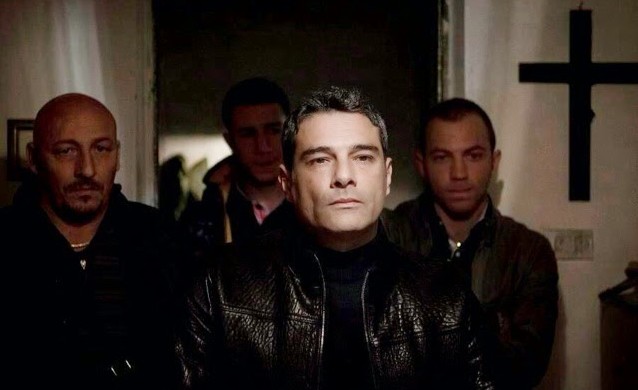“Black Souls” (Anime nere) is the latest Italian film to make its way to American shores, and it’s being warmly embraced by our critics and audiences. The title is appropriate for the tone of the film. It is very dark indeed. Its characters are trapped in a world dominated by organized crime. But “Black Souls” is not your typical mafia movie. It’s a story about brothers and family bonds.
The cast — led by profoundly talented actors Marco Leonardi, Fabrizio Ferracone and Peppino Mazzotta — have so much chemistry, it’s easy to forget you’re watching a movie. Africo, the Calabrian town in which it was shot, has a dreary mystical atmosphere that sets the stage for a dark family drama with absolutely mind-blowing performances.
“Black Souls” is in the midst of a nationwide theatrical release that includes New York City on April 10; San Francisco, Washington, D.C. and Philadelphia on April 17; Los Angeles and Seattle on April 24; Dallas and Portland on May 1; Chicago, Miami, San Diego and Honolulu on May 8; and Boston on May 22.
Join us right here for weekly interviews with the film’s stars. Today, we talk with director Francesco Munzi about the meaning behind the story.
Fra Noi — The movies that you’ve made — “Il resto della notte.” “Saimir” and now “Anime nere” — speak of corruption, immigration and organized crime. What fascinates you about these themes in society?
Francesco Munzi — I like speaking about minorities and immigration. The people of the South are also minorities, especially in this small mountain village. Often, the characters of the film spoke in dialect, and even the Italian version needed subtitles. When I speak of themes like crime and drug trafficking in my films, it’s easier to demonstrate humanity where there is always a fight between good and evil.
Fra Noi — Why did you want to tell the story of “Anime nere”?
Francesco Munzi — I read the book while I was working on another script. I loved the book so much, I stopped working on the other project and immediately got to work on “Anime nere.”
Fra Noi — What do you love about the book?
Francesco Munzi — I love that it speaks of a wild, mysterious world where this Calabria mafia, ‘Ndrangheta, was born. It’s a mafia with two faces: one in the agriculture of the mountains and the other in big city finance. I tried and succeeded in shooting the film in the real village, which is considered one of the most dangerous regions of Italy.
Fra Noi — Did the locals give you any problems while you were shooting?
Francesco Munzi — No, because they knew the author of the book, Gioacchino Criaco. He comes from that town, so everyone was supportive because they considered it their project, not just mine. And they understood that it was a fictional film, not a documentary, so they cooperated with us, and many locals appeared as extras in the film.
Fra Noi — What was the reaction to the finished product?
Francesco Munzi — We screened the film in the town and I was afraid of the reaction, but the mafia was silent. The rest of the population felt that we were doing something positive by making a film, so they were happy.
Fra Noi — How have audiences outside Italy reacted to the film? Do they understand the severity of the story or do people see it as just another mafia movie?
Francesco Munzi — For marketing reasons, the promoters speak generally of the mafia. But when the audiences see the movie, they understand that it’s not a gangster movie. I speak of the relationship between brothers, and that within a crime family, not everyone is corrupt. It’s a story of humanity and how a father wants a different life for his son.
Fra Noi — The performances of your actors were outstanding. Tell me about Luigi. Marco Leonardi gives his character a lightness and sense of humor even in the middle of conflict. Did you and the other writers create Luigi with this quality or is that something that came through Marco’s interpretation of the character?
Francesco Munzi — When an actor meets a character, something always changes. Marco was born in Calabria, so he knew the dialect and also knew the location. So he was great in the role of Luigi because I wanted to create a bad guy, but also someone that could be empathetic with the audience. I don’t like when characters are all black or all white. I tend to change the script after the actor has been chosen for the role in order to find an equilibrium. It’s important to find realism and truth on screen.
Fra Noi — What is the message of this film?
Francesco Munzi — Well I didn’t put a character in the film that would resolve the problems, like someone from law enforcement or government. It was important to me to have that character come from within the family to fight their own war. Luciano wanted his son to be different than his brothers but in the end, he didn’t succeed, so he wants to cut the connection. I wanted to show the different shadows within a family. Just because the family is associated with organized crime, that doesn’t mean that every family member is corrupt.
 Fra Noi Embrace Your Inner Italian
Fra Noi Embrace Your Inner Italian







